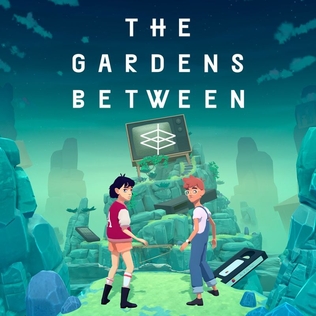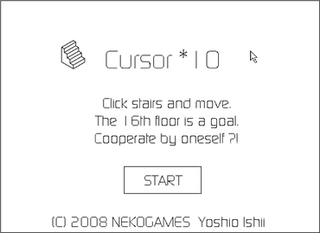Related Research Articles
Double Fine Comics is a webcomics collective supported by Double Fine Productions. Each comic varies in style and tone, but they all reflect the eclectic humor found in the Double-Fine produced game Psychonauts. The webcomics were published in Adobe Flash format on the company website under the heading 'Comics'.

Creative Assembly Sofia is a Bulgarian video game developer based in Sofia. It was founded in May 2001 by Vesselin Handjiev. In July 2008, the company was acquired by Crytek, which then sold it to Creative Assembly in March 2017.

Rock Paper Shotgun is a British video game journalism website. It was launched in July 2007 to focus on PC games and was acquired by Gamer Network, a network of sites led by Eurogamer, in May 2017.

Don't Look Back is a platform game playable through Adobe Flash and designed by Terry Cavanagh. The game is a modern interpretation of the Greek legend of Orpheus and Eurydice.

SpaceChem is a puzzle and indie game by Zachtronics Industries, based on principles of automation and chemical bonding. In the game, the player is tasked to produce one or more specific chemical molecules via an assembly line by programming two remote manipulators that interact with atoms and molecules through a visual programming language. SpaceChem was the developer's first foray into a commercial title after a number of free Flash-based browser games that feature similar puzzle-based assembly problems.

Zachtronics LLC is an American video game developer, best known for engineering-oriented puzzle video games and programming games. Zachtronics was founded by Zach Barth in 2000, who serves as its lead designer. Some of their games include SpaceChem, Infinifactory, TIS-100, and Shenzhen I/O. Infiniminer (2009) inspired the creation of Minecraft.

Mari0 is a 2012 side-scrolling platform video game developed by German indie developer Maurice Guégan with creative input from Sašo Smolej and released onto their website Stabyourself.net. It combines gameplay elements from Nintendo's Super Mario series and Valve's Portal series. The game features Mario armed with a "portal gun", the main game mechanic in the Portal series, allowing him to create two inter-spatial portals on 2-dimensional surfaces which can transport himself, enemies and other objects through them. It was made with the LÖVE game framework.
GROW is a series of Flash or HTML5-based puzzle games created by On Nakayama, a Japanese indie game developer, and posted to his website, eyezmaze.com. The series, which was launched on February 7, 2002, comprises 12 full games, 7 minigames, and 1 canceled game. The most recently released title was published in June 2018. The games all feature a simple click-button interface requiring the player to determine the correct combination of buttons to click to maximize visual reward and ultimately to achieve the good ending. Graphically spare and minimalist, GROW games employ a cute aesthetic and often include creatures and characters taken from On's other games like those in the Tontie Series.

Escape Goat is a puzzle-platform game developed and published by independent developer MagicalTimeBean, for the Xbox 360, Microsoft Windows, OS X, Linux, and Nintendo Switch.

Mini Metro is a puzzle strategy video game developed by New Zealand indie development team Dinosaur Polo Club. Players are tasked with constructing an efficient rail transit network for a rapidly growing city. The game's visual style makes use of bold colours and simple geometry to replicate the appearance of modern transit maps. The game uses a procedural audio system to generate sounds based on the player actions and transit network, with inspiration from works of minimal music.

Portal Stories: Mel is a 2015 puzzle-platform modification for Portal 2 developed and published by Prism Studios. Set in the Portal universe, the player controls Mel, a test subject with a prototype of the portal gun who must escape an underground facility after spending decades in artificial hibernation by completing puzzles. The player is guided by maintenance core named Virgil. The game includes custom voice acting, a soundtrack, and texture assets.

Fran Bow is a graphic adventure game with psychological horror elements developed and produced by Killmonday Games, a Swedish indie game studio. The game was released in 2015 for PC and in 2016 for mobile. In 2023, it was ported to the Xbox Series X/S, Xbox One, Nintendo Switch and PlayStation 4.

Sokobond is a puzzle video game created by Alan Hazelden and Harry Lee. Gameplay involves moving atoms around 2D grids to form chemical compounds. The game was released on Linux, OS X, and Windows in August 2013. It was later released for Nintendo Switch in September 2021, and iOS and Android in May 2022. The game received generally favorable reviews from critics.

6180 the moon is a 2013 puzzle-platform game developed by Turtle Cream and Jongmin Baek. It was initially released for Microsoft Windows in March 2013 as part of an Indie Royale bundle. The game follows the story of the Moon searching for the Sun after it has gone missing, leaving the people of Earth to suffer in an eternal night.

The Gardens Between is an adventure/puzzle video game developed by Australian studio The Voxel Agents and published in September 2018 for Windows, macOS, Linux, Nintendo Switch, and PlayStation 4. It was later released for Xbox One in 2018, iOS in 2019, Android in 2020, and PlayStation 5 in 2022. The game, which conveys its story through visuals and gameplay rather than dialogue or narration, follows two children, Arina and Frendt, in the treehouse in a garden between their houses. In a dreamscape, they progress through sets of island levels, each representing different shared experiences. The characters walk along a path that winds through each level, and the player solves environment-based puzzles that prevent the pair from reaching and activating a portal at the end of the path. To do so, the player controls the flow of time forwards and backwards and causes the characters to interact with nearby objects and spheres of light, rather than moving the pair directly.

Cursor*10 is a web-based browser game developed by the Japanese company Nekogames and designed by Yoshio Ishii. The game is Flash-based.

Silt is a surreal underwater puzzle-adventure indie horror game developed by Spiral Circus and published by Fireshine Games for Microsoft Windows, Nintendo Switch, PlayStation 4, PlayStation 5, Xbox One, Xbox Series X/S, in which the player controls a deep-sea diver who can possess the diverse marine life that enters their vicinity. It was released on June 1, 2022.

Jagged Alliance: Rage! is a turn-based tactics video game developed by Cliffhanger Productions and published by HandyGames for the PC, PlayStation 4, and Xbox One in December 2018. It is part of the Jagged Alliance series.

A Little to the Left is a 2022 puzzle game developed by Canadian indie studio Max Inferno and published by Secret Mode.

Bonfire Peaks is a 2021 puzzle video game by Canadian indie developer Corey Martin. Gameplay involves moving boxes to traverse a 3D grid and burn the player character's belongings. Created as a prototype for 2018 game jam Ludum Dare 43, it was published by Draknek & Friends for Linux, macOS, Windows, Nintendo Switch, PlayStation 4, and PlayStation 5 in September 2021. The game received generally favorable reviews from critics and was nominated for "Best Indie Game" at the 2021 Golden Joystick Awards.
References
- 1 2 3 4 5 6 7 Walker, John (May 8, 2015). "The 25 best puzzle games ever made". Rock Paper Shotgun . Archived from the original on February 21, 2022. Retrieved October 30, 2023.
- 1 2 3 4 Walker, John (March 15, 2015). "Have You Played... Hoshi Saga?". Rock Paper Shotgun . Archived from the original on May 12, 2021. Retrieved October 30, 2023.
- 1 2 3 4 Rose, Mike (May 2, 2011). 250 Indie Games You Must Play. CRC Press. p. 144. ISBN 9781466503175.
- 1 2 3 4 5 Renovitch, James (May 27, 2010). "This Week's Waste of Time". The Austin Chronicle . Archived from the original on January 30, 2022. Retrieved October 30, 2023.
- 1 2 3 Tagliaferri, Simone; Rubbini, Andrea (February 10, 2010). "Underground Vol. 28". Multiplayer.it (in Italian). Archived from the original on October 30, 2023. Retrieved October 30, 2023.
- 1 2 3 Benedetti, Winda (October 5, 2008). "Games: 'Hoshi Sage 1, 2 & 3'". Seattle Post-Intelligencer . Retrieved October 30, 2023.
- ↑ "Browser Game: The Stars Come Out for Hoshi Saga". Wired . May 22, 2007. Archived from the original on December 1, 2020. Retrieved October 30, 2023.
- 1 2 Walker, John (April 8, 2008). "Who On Earth Is Yoshio Ishii?". Rock Paper Shotgun . Archived from the original on May 28, 2023. Retrieved October 30, 2023.
- ↑ Duwell, Ron (March 15, 2014). "Best of BitSummit 2014 - Best Japanese Indie Games To Watch Out For". Techno Buffalo. Archived from the original on August 19, 2022. Retrieved October 30, 2023.
- ↑ PC Gamer Volume 15, Issues 8-10. GP Publications. May 3, 2011. p. 47.